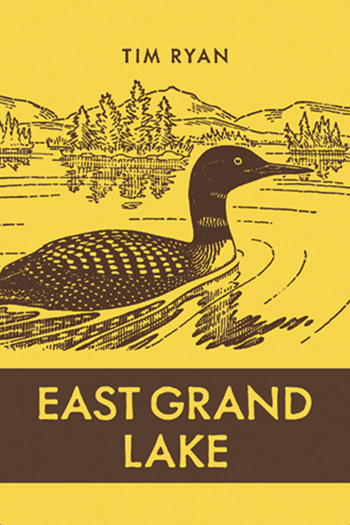When Tim Ryan won the 2017 Alberta Views short story contest for “Scottie,” he told the magazine it was only the first in a collection of short stories he was working on. On the other side of a six-year gestation comes an expanded universe in East Grand Lake, a novel in 14 stories told from 14 different points of view over the course of just a few days at the Murphy family lakeside reunion.
Inherent to this type of sprawling architecture is the risk that a novel may not have a centre to hold it upright and keep the reader’s attention. Ryan mitigates this risk with the character of Shayne, whose narration weaves through the other stories, binding them together in the process. “The Camp is this place my mom’s family, the Murphys, have on East Grand Lake. It’s not a ‘camp’ in the sense of tents, cooking fires and sleeping bags. It’s a cottage,” he reflects on the drive there. “If it were any other year, I would have put up a big stink.” It is only upon arrival that Shayne makes his reluctance known, refusing to leave the car and interact with the extended family whom he barely knows.
It might not be hard to imagine a kid today spending their lake vacation in a car, sprawling on the backseat with the glare of a smartphone on their face. But East Grand Lake is an exercise in nostalgia, far removed from the loneliness epidemic and smoke-filled skies that plague us today. This is 1972—a time when cottages were redolent of glowing cigarettes, Olympic games were proxy battles of a Cold War and kids fell into books instead of video games. Shayne’s sightline overtop of his Hardy Boys novels serves as the central focal point, his cousins battling waves on the lake, rocketing water balloons at tree forts and capturing frogs in buckets, all in a steady stream of motion orbiting the backseat of the car.
The book, however, is not merely a gesture to simpler times, and Ryan reminds us that childhood angst and conflict don’t vanish in the summer sun. When Shayne ruminates on his father, a former academic, following a path less travelled, we learn this: “I think this attitude got Dad into trouble at the university and frustrated Mom, but it also meant he got interviewed on TV, got invited to places like Oxford and New York and Tokyo to speak, and meant he never had to wear a suit. People wanted to hear him talk about what he’d seen walking that other direction. He walked in that direction my whole life… until he didn’t.”
While East Grand Lake may catch us yearning for the warm months of summer, it ultimately demonstrates the futility of escapism. Then again, perhaps there is no better place to confront inner turmoil than at the shoreline of a lake, amongst the rustling leaves and lapping waves.
Geoffrey Picketts works and writes at Alberta Views.
_______________________________________


